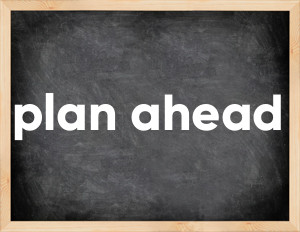 The English verb 'plan ahead' is pronounced as [plæn əˈhed].
The English verb 'plan ahead' is pronounced as [plæn əˈhed].
Related to:
phrasal verb.
3 forms of verb plan ahead: Infinitive (plan ahead), Past Simple - (planned ahead), Past Participle - (planned ahead).
Here are the past tense forms of the verb plan ahead
👉 Forms of verb plan ahead in future and past simple and past participle.
❓ What is the past tense of plan ahead.
Plan ahead: Past, Present, and Participle Forms
| Base Form | Past Simple | Past Participle |
|---|---|---|
| plan ahead [plæn əˈhed] |
planned ahead [plænd əˈhed] |
planned ahead [plænd əˈhed] |
What are the 2nd and 3rd forms of the verb plan ahead?
🎓 What are the past simple, future simple, present perfect, past perfect, and future perfect forms of the base form (infinitive) 'plan ahead'?
Learn the three forms of the English verb 'plan ahead'
- the first form (V1) is 'plan ahead' used in present simple and future simple tenses.
- the second form (V2) is 'planned ahead' used in past simple tense.
- the third form (V3) is 'planned ahead' used in present perfect and past perfect tenses.
What are the past tense and past participle of plan ahead?
The past tense and past participle of plan ahead are: plan ahead in past simple is planned ahead, and past participle is planned ahead.
What is the past tense of plan ahead?
The past tense of the verb "plan ahead" is "planned ahead", and the past participle is "planned ahead".
Verb Tenses
Past simple — plan ahead in past simple planned ahead
(V2).
Future simple — plan ahead in future simple is plan ahead (will + V1).
Present Perfect — plan ahead in present perfect tense is
planned ahead
(have/has + V3).
Past Perfect — plan ahead in past perfect tense is
planned ahead
(had + V3).
plan ahead regular or irregular verb?
👉 Is 'plan ahead' a regular or irregular verb? The verb 'plan ahead' is .
Examples of Verb plan ahead in Sentences
- I planned ahead and bought my tickets a month in advance, which saved me a lot of money (Past Simple)
- We can think as a community and plan ahead (Present Simple)
- We're working on planning ahead (Present Continuous)
- Sorry, man, but you should have planned ahead (Present Perfect)
- I like a man who plans ahead (Present Simple)
- If he didn't kill Allie, then why plan ahead to beat the polygraph? (Present Simple)
- I think she was planning ahead (Past Continuous)
- Mark's coming in from Florida and I really want him to meet everyone, so I kind of gotta plan ahead (Present Simple)